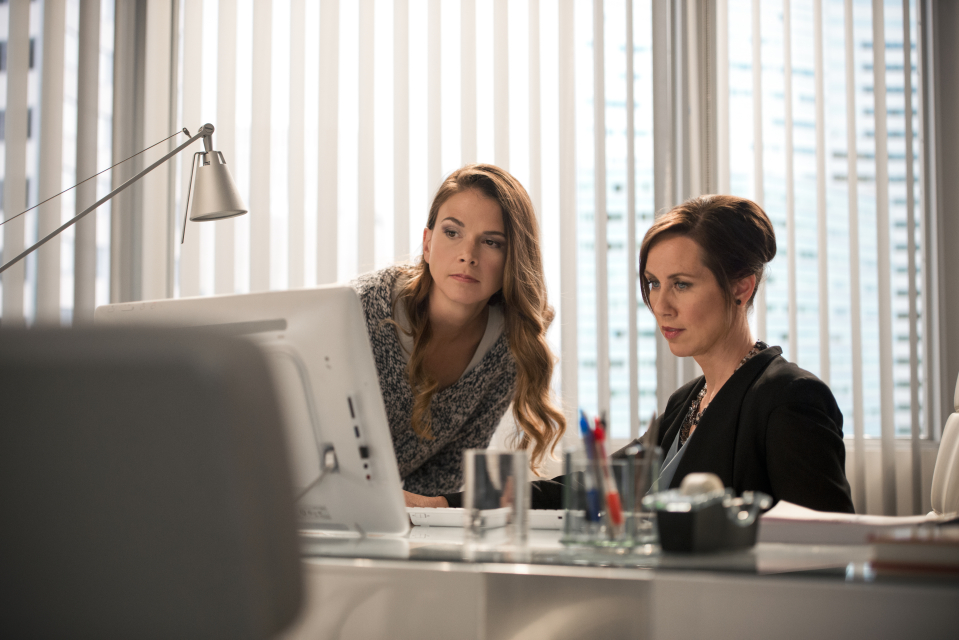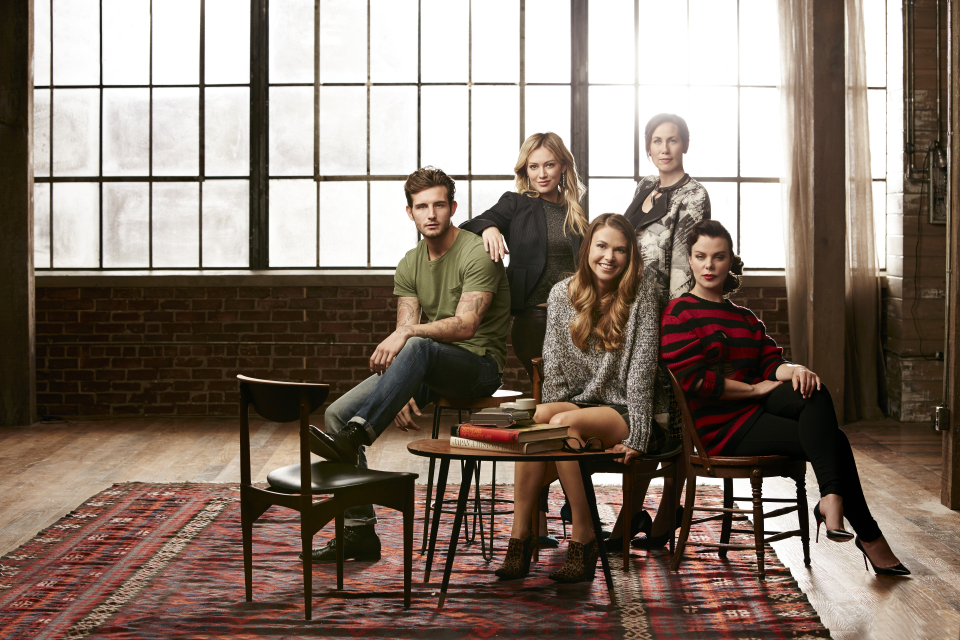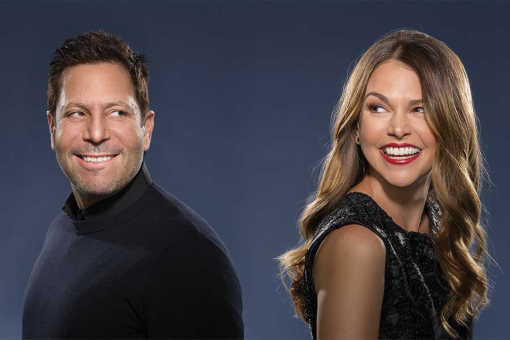On the TV Land hit, Younger, Miriam Shor’s Diana Trout – head of marketing at Empirical Press – intimidates by donning ever bigger and bolder statement necklaces.
It’s as if to say, “Nothing – not even the weight of my accessories – will take me down.”
In real life, Shor is every bit as impressive as her character but far more easy to talk to. You can bring up any topic with the New York City-based actress – who became well-known after her role as Yitzhak in the original off-Broadway production of Hedwig and the Angry Inch (and later the 2001 film) – and she brings her conversational A-game.
The ability to talk on any topic probably plays into why Shor is an actress whose career is varied and not one-note. (This summer, for example, she tackled the part of “predatory lesbian bookworm” Madeline True in the off-Broadway musical The Wild Party, which also starred Younger lead Sutton Foster.)
So, for example, when you begin talking about marketing and branding, the wheelhouse of her Younger character Trout – Shor is thoughtful on the subject: “I resist marketing or branding myself. It’s not what I want to do with my time. I don’t want to sell you the picture of who I am. You can see my work and take it or leave it. Or if you’re my friend, you can be my friend and like me or you can decide not to.
"It’s interesting being a woman and getting older and being a mom, people want to put that label on you and define that for you – they want to put you in this box here or that one there. But we like to do that as a society.”
Maybe it’s her awareness of the boxes that keeps her out of them. We spoke to Shor about resisting typecasting, her role on Younger, and more.
Younger is so much fun. How did that role come about and what do you like about doing that show?
I feel really, really lucky because I worked with Darren Starr on a show called GCB (a 2012 ABC comedy) and had a great time with him. When that ended, Darren was working on Younger and thought of me for this role. That’s not something that happens to most actors and certainly not to me.
So I felt really lucky that I got to test for it and got it. I think he has a great feel for female characters in particular and I was really excited to be involved.
So, right away he had me interested just because it was [working with] him but then I read the script and just loved it and this character in particular is pretty fantastic. Plus, we’re shooting in New York City which is where I live and it’s my home and where I want to be – so it was just a trifecta of awesomeness.
Darren and the script and New York City: I was like, “I’m in. I’m in, I’m in. I’m here. What can I do?”
Now we’re shooting our second season, which is great. I’ve done a lot of shows at this point and this is the first show where I’m a series regular that we’ve gone to a second season. I’ve done some really great things and been recurring on things that have run for a long time but to be a regular and come in with a show when it starts and see it get a bigger and bigger audience and get better and better is so awesome.
You mentioned Darren and how he gets women – and the show actually says something about being a woman, in this case one dealing with what it’s like to be over 40 in the publishing industry. Do you feel like the show is part of a bigger conversation?
Yeah, I’m really proud of it. In the business of playing pretend – which is what we do – there are projects you’re super proud of, projects that are fun and projects where you’re like, “well, I gotta work.” So it’s nice to be part of something I’m proud of. And it’s also a delightful confection of a show that’s actually about something.
I love being interviewed about the show because I actually have something to talk about that matters to everybody and is a subject that we should talk about, which is ageism and ageism in the workplace particularly for women.
It’s a good conversation and one we should be having. It would be nice if we didn’t have to have that conversation at all. But we do and I love being part of that conversation.
Some of the same issues come up in the entertainment industry, maybe to an even larger degree. Do you feel like there are any positive moves for women in the business?
I think that progress is always two-pronged. One prong is the one you are hoping for and the other is the backlash against it. And the two are always traveling side by side so you can look over and see what you’re fighting against on the journey to the goal. It’s undeniable that is a moment for women. Yet, at the same time, there shouldn’t be a moment, if should be all the time.
So the celebrations and the frustrations are simultaneous.
There was that article in the New York Times about women directors and it’s hard to read that and not have your blood pressure go through the roof. It’s so astonishing. And being a person who does plays, in 2014, 13 of the new plays on Broadway were written by men.
Obviously, that’s not because women are saying, “You know what, I’m not going to write a play.”
This entertaining confection you’re part of is so woman focused that it must launch some conversations, even if they start from a fun place.
Yes, everywhere, with friends and family to people in the industry. It could start with “oh my god, that necklace” but it eventually gets to what we’re talking about. And I think it’s great. And it doesn’t preclude it from being a fun enjoyable show. We can have that too.
The story exists because there’s a story to be told.
Being in New York, do you have friends in the publishing industry who confirm some of this goes on?
It’s astonishing that it’s still an issue anywhere, but it’s crazy that ageism is so common an industry like publishing where you hope your intellect is what is valued the most.
And so obviously anyone a little bit older would have more to offer from experience and wisdom but everyone is always looking for the hot young blah blah blah and even looking for the hot young audience and authors. And they’re great and I read them too but why should we have to label everything?
On Younger, I’m playing a marketing director and you have to market and sell and books are tough to sell. Right now is an interesting place and time for the publishing world, at this moment where the old and new world are wrestling and trying to do this.
You have to encapsulate something that shouldn’t be encapsulated in a sentence. I would hope if I wrote a book it could not be distilled in two sentences – I hope that would be too hard. In real life, I’d just fall into a coma of confusion.
It seems actors sometimes have to distill themselves into a line or two, too. And though you’ve done a great job of resisting typecasting, it seems like maybe you have to keep reminding the people you work with who you are?
That’s exactly it, in a way. It’s always something you need to go over and discuss, which is a weird thing – sitting around talking about myself starts to feel really gross after a while. I just think, “Can we talk about something else? Please?”
I feel really lucky that I have gotten to work on projects that I find interesting – they’re fun, challenging and different from one thing to the next. Because usually when you play one thing you’re typecast as that thing until you can break out of it – that’s a struggle for every actor. I know fantastic actors out there who it doesn’t work out that way for.
Do you have advice for people starting their careers in this field?
I think you have to balance your idea of what kind of career you want with the things that actually excite you. You do have to think about what jobs will get you noticed, sure, but you also have to think about the jobs that get you excited. And those things often don’t come hand in hand so you have to remember why you’re doing this and what got you to want to do this.
There was some germ of this that was art for you that you wanted to pursue and it’s good to find things you can be excited or scared by. It’s always good to be able to say, “Wow, I don’t know how I’m going to do this” instead of “Oh, same old, same old. “
But also, you have to work, because you have to pay the bills.
As new season comes up and as you juggle family and work, what does your day to day look like?
One of the great things about the show is that Sutton’s character is the driving force of the show and it’s an ensemble piece too. So my work weeks can go from being very busy to not being that busy, which means I can have a lot of time with my kids and family and husband -- and for myself, which is really nice.
Plus I am in New York, which is where I want to be – I can go to the theater and see plays and still be in that world too. And on my time off do a show like I did this summer [with The Wild Party].
I feel lucky that I have some time. There was a time when I was younger when I thought, “I want to be the lead, I want to be the lead!” but now I just want to be interested in what I do. It doesn’t need to be about me. I just want to be part of telling a story.
That’s something that’s changed for me as I’ve gotten older that has been a good discovery. It’s nice to have that time and get some days to yourself. I make career choices based on wanting to have time with my family and for myself because it’s important to me. I ask myself, “Is my life going to be the life I want to have?” Right now, it really is, so it feels amazing.







